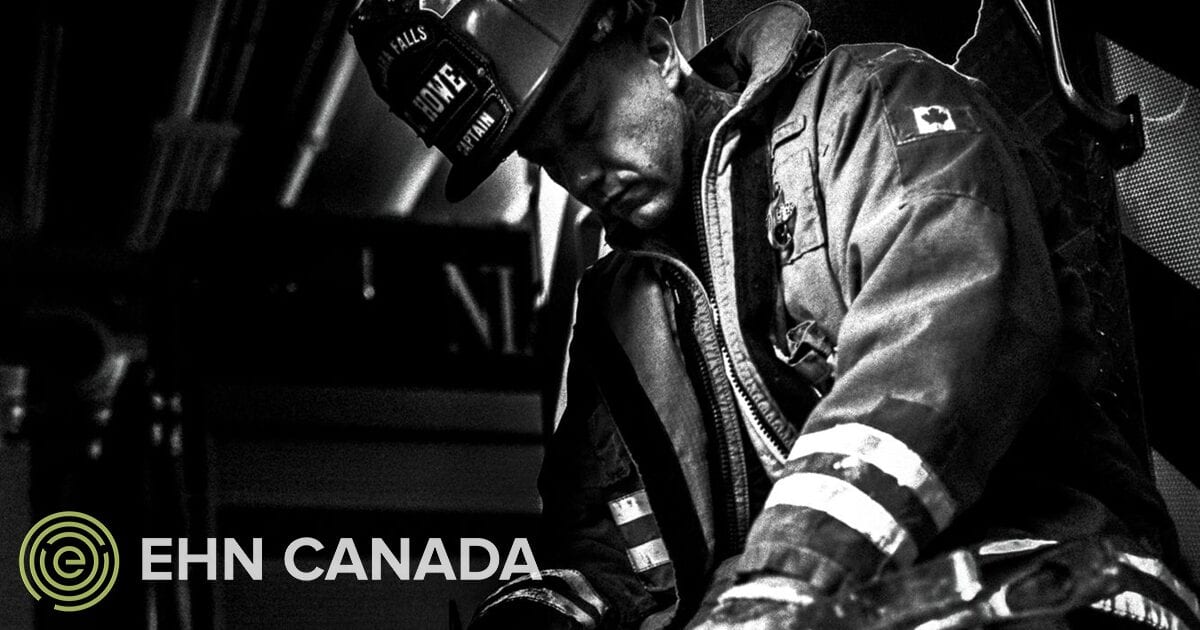Opinion by EHN Guest Writer
Written by Chris Howe, public speaker, recovered alcoholic and addict, and firefighter.
I have lived with mental health disorders for most of my life. As a kid, I didn’t realize that what I was experiencing could be classified as anxiety or depression. As time went on, I found myself coping with my mental health disorders by using drugs and alcohol. As time went on, I found myself coping with my mental health disorders by using drugs and alcohol. I used substances to mask what was going on internally and compensated through irrational or extreme behaviour.
When I started working as a firefighter, on my very first day, a senior firefighter gave me some advice: he told me never to show my weaknesses at work, because we, as firefighters, tended to prey on our weak. These words stuck with me for the first eight years of my career. Knowing that I was suffering from a variety of mental health as well as substance use disorders, I feared that I would be viewed as a weak link by my peers and co-workers. I spent the first few years trying to balance my work life and social life and to keep the two completely separate. I didn’t want my co-workers to know the extent of my mental health and substance use disorders. But, I also had no idea how to stop using substances and I was unable or unwilling to take a look at myself and face my mental health disorders.
After a while, I couldn’t hide who I was from my co-workers. I was isolating, acting irrationally at work, experiencing withdrawal symptoms, having extreme highs and lows while on the job, and simply not treating myself or others with respect. This made going to work very difficult because I knew that I was being perceived and talked about as an unproductive and unreliable team member. I felt a great deal of guilt, shame, and remorse. I wanted to perform at work. I wanted to show up fit for duty every time I walked in through the doors. But I just couldn’t bring myself to ask for help. The words that I’d heard on my first day were ingrained in my memory. Even though I desperately wanted to change, I was extremely fearful that I might fail, or even worse, that I might be outed as someone who was too mentally weak for the job.
Abuse of sick time, showing up unfit for duty, lack of confidence in my skills, and an inability to recognize or admit my deficiencies would shame me for eight years. Every time I put on my uniform, I felt like a fraud. I felt unworthy of the job and the responsibility that came with it. I was in a career where I was counted on to save people’s lives, but I couldn’t even manage my own. I was plagued with thoughts of suicide, which eventually turned into attempts. I started to get into more trouble off the job and find myself in predicaments that I never would have expected of myself. The deep, dark depression and anxiety around every aspect of my life haunted me 24/7. I had no relief.
One morning, in January of 2011, I woke up with the intention to commit suicide. I thought that I had no other way out of the life that I had created for myself. I knew I couldn’t go on living the way I was living anymore, but sincerely didn’t want to die. As I sat with a pen and paper in hand, writing a list of the different ways I thought I could commit this desperate act, a wave of emotions came over me and I decided not to make this ultimate decision. I knew at that point, I was in a place of complete surrender. I needed to change. I immediately dropped the pen and started searching for support group meetings that could possibly help me with my mental health and substance use disorders. To my surprise, there were many in my area and most of them were free. I went to an evening meeting that same night and admitted my weaknesses and vulnerabilities for the first time.
Since that day, I have not used drugs or alcohol—my life had changed. I started to use my employee assistance program at work. I attended meetings and counseling sessions. I spoke with doctors about my problems. After some time, my life started becoming manageable again. I found I could mend my relationships, both inside and outside of work, using my new outlook on life that I’d discovered. I spoke with my employer as well as with many of my coworkers about what had been going on. To my absolute disbelief, I received an abundance of support and help throughout my department. People started to open up to me about things they had been dealing with as well. I found I finally had a place in my career.
Today, my relationships, both inside and outside of my job, are authentic and supportive. I can be a resource to people who may be going through experiences similar to mine, plagued by the stigma they associate with asking for help. My only wish is that no one has to go through what I went through to find peace and serenity in their life. Mental health disorders can be debilitating and extremely powerful and are not to be overlooked or passed off as a blue mood or something that can be simply wished away. Let’s all do our part in creating safe and judgement-free workplaces where we can talk about what’s really going on! Nobody should suffer in silence!
Call Us If You Have Any Questions
If you would like to learn more about the treatment programs provided by EHN Canada, enrol yourself in one of our programs, or refer someone else, please call us.. Our phone lines are open 24/7—so you can call us anytime.




